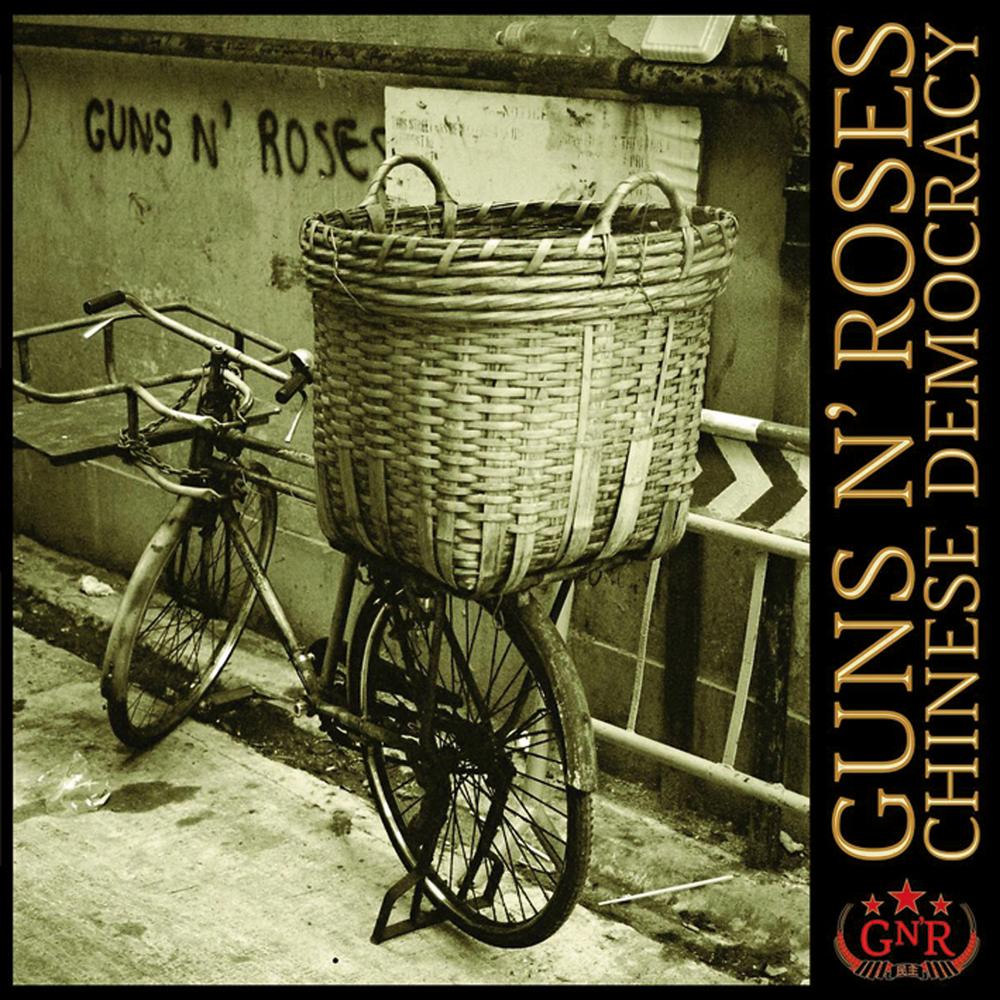
Perhaps the most anticipated album of our age, Guns ‘N Roses’ long-brewing Chinese Democracy broke its 15-year gestation period with a bit of a whimper. While the media’s incredulous exhortations of the album were unrelenting in the weeks before its release, sales and radio response have been somewhat less stunning. The critical reaction is similarly mixed: Paste called the record “a bottomless pit dug by disposable income, a persecution complex, and egomania,” while Rolling Stone maintained that it was an “audacious, unhinged and uncompromising hard-rock record.”
While his guest review for the Onion addressed a number of shortcomings, best-selling author, acclaimed music critic, and general Axl enthusiast Chuck Klosterman ultimately came out in heavy defense of the album. After the jump, Klosterman goes one-on-one with Flavorwire’s resident hair-metal hater and Unpopular Opinions aficionado, The Beard, on the album itself, the reasons for its muted reception, and the underpinnings and larger implications of his outlook.

[10:14] The_Beard: hey there
[10:14] The_Beard: good to see ya
[10:15] NotChuckKlosterman: This is really weird. I have not IMed since 2005!
[10:18] The_Beard: i don’t use it much either
[10:20] The_Beard: ok, so obviously there’s been an enormous amount of discussion around your review of the new Guns N roses record.
[10:20] NotChuckKlosterman: Yes.
[10:20] The_Beard: I love your opening line: “Reviewing Chinese Democracy is not like reviewing music. It’s more like reviewing a unicorn.” That’s the way I felt about reviewing Brian Wilson’s Smile.
[10:21] NotChuckKlosterman: Smile is probably the best analogy, although even that situation was pretty different.
[10:22] NotChuckKlosterman: I feel like there were far fewer people interested in the possibility of Smile being a failure.
[10:22] The_Beard: i guess that’s true
[10:22] The_Beard: people seemed to be rooting for Brian Wilson in a way they weren’t for Axl Rose
[10:23] NotChuckKlosterman: Nobody hates Brian Wilson. At this point, people only feel adoration or sympathy for him.
[10:23] NotChuckKlosterman: And why wouldn’t they?
[10:25] The_Beard: well, i mean, i think there was a point when Wilson was just as eccentric and probably had alienated his fans just as much, but that sort of faded over the course of the following 20 or so years.
[10:25] The_Beard: In guns ‘n roses’ case, it’s almost as if the record needed to come out 10 years ago, or 10 years from now to get that sort of treatment
[10:27] NotChuckKlosterman: Ten years from now, yes. If it had come out in 1998, I think it would have been a totally different situation.
[10:28] The_Beard: how so?
[10:35] NotChuckKlosterman: Well, for one thing, it wouldn’t have seemed like such an epic, Sisyphean endeavor. It would have just seemed like a record that was very delayed (like the Use Your Illusion albums or Hysteria or anything else that took more than three years to record). So people would have been less interested in the abstract, personal meaning of the record. It also would have sold at a much different volume, because ’98 and ’99 were huge years for music sales. It would probably have opened at 800,000 to a million during the opening week, which would have changed the context. Plus, none of the songs would have been able to widely leak in ’98, so the first time people played the album would really have been the first time they heard it. And most importantly, there would not have been this internet machine that requires everyone in the world to react to everything (and then to react to other people’s reactions).
[10:35] NotChuckKlosterman: Things like this particular interview, for example, would never have happened.
[10:36] NotChuckKlosterman: The idea of analyzing the meaning of a 1800-word review two weeks after it was published would not have occurred.
[10:36] NotChuckKlosterman: Which is interesting to me.

[10:37] The_Beard: haha, well, i think it would have, but I probably would have just ranted at my screen, or, maybe even a *gasp* printed piece of paper
[10:37] The_Beard: but, i think you’re right, it certainly would have been a lot less of a high-pressure deal
[10:37] The_Beard: Not to get into the specifics of record too much, but I also think it might have been received more properly in the context of what was happening at the time
[10:38] NotChuckKlosterman: More properly?
[10:38] The_Beard: i don’t know if you’d agree or not, but a good friend of mine called this record “the bridge to nu-metal that never was”
[10:38] The_Beard: i think it would have been a radio sensation
[10:39] NotChuckKlosterman: It doesn’t have nu metal lyrics, though. He does not sing in a nu metal way. The only aspects of nu metal on Chinese Democracy are sort of how the guitars sometimes crunch in this processed, non-bluesy way. I don’t really see it as part of that genre.
[10:40] NotChuckKlosterman: “Oh My God” was kind of like nu metal, I suppose. But if that had been kept on the album, I assume it would have sounded differently than it did during the credits of “End of Days.”
[10:41] The_Beard: well, i do feel like a lot of parts of it feel much more like the late-90s than they do the GNR hey-day.
[10:41] The_Beard: like a natural progression that now is maybe a little more awkward because it was a 5 year progression not a 15 year one
[10:45] NotChuckKlosterman: That’s true. But that is intentional. The core musical difference between Rose and the other guys in GNR was that Axl never stopped being obsessed with new music. He always seemed fixated on what’s new. In 1995, he would be like, “We should be listening to Ministry and Nine Inch Nails and Tori Amos.” The other guys were more like, “That is idiotic. We should still be listening to AC/DC and the Stones and Aerosmith exclusively.” So my assumption is that Axl probably was listening to a lot of nu metal during the early stages of this album, because that was what was popular at the time. And he took a few elements of that style, but was able to slowly eliminate most of them during the multiple edits that happened post-2001.

[10:49] NotChuckKlosterman: That first GNR record is really an anomaly, because the band was heavily pushed (by Geffen) toward including no ballads on Appetite for Destruction (and to save them all for the follow-up record). As such, Appetite seems like this really aggressive, relatively raw metal album. But I have no doubt that Rose would have preferred to have “Don’t Cry” and whatnot on Appetite. He always liked ballads and multi-part epics more than songs like “Night Train.” But that was a compromise, and — in 1986 — Axl would still make compromises.
[10:49] The_Beard: haha, yeah, back when he couldn’t
[10:50] The_Beard: get exactly what he wanted
[10:50] The_Beard: do you think people expected the sound to be what it was? I think hardcore fans have been obsessing over leaks for years, but the expectations of a lot of people i know were pretty wide open..
[10:52] NotChuckKlosterman: I don’t know what people expected. Most casual fans assume every new record by an artist they like should be exactly like the previous release.
[10:53] The_Beard: i think that’s probably true. most people were amazed that it was really happening.
[10:53] The_Beard: that sort of goes back to your “unicorn” point
[10:54] The_Beard: when so many expectations are whirling around (other people’s and your own), do you think a reviewer can really review something objectively? Or, maybe better said, on its merits alone?
[10:55] NotChuckKlosterman: No.
[10:55] NotChuckKlosterman: Not entirely.
[10:55] NotChuckKlosterman: You try to be aware of your biases and compensate for them, and you try to not think about what other people have written.
[10:56] NotChuckKlosterman: I was not concerned about objectivity when I wrote that review.
[10:56] NotChuckKlosterman: The Onion asked me to write about it, and I said, “Okay.”
[10:57] NotChuckKlosterman: I had no desire to convince anyone to buy (or not to buy it). I never do.
[10:57] The_Beard: that’s interesting, because you made a pretty clear point in the middle that you were going to give it the level of scrutiny axl gives his songs. And i think at a lot of points you did that
[10:57] NotChuckKlosterman: Yes.
[10:58] NotChuckKlosterman: I hope so.
[10:58] The_Beard: if i can jump on that point a bit, i felt like there were almost two threads running through your mind
[10:59] The_Beard: one was this very scrutinizing thread, and the other was very attached to the idea of the songs matching your vision of, i think you said something like, “what songs should be.”
[10:59] The_Beard: i guess i was very intrigued to see an A- review with so much to say about the record’s faults, or holes
[11:00] NotChuckKlosterman: I suppose that is a reasonable reaction.
[11:00] The_Beard: were there two threads, or am i reading too much into it?
[11:01] NotChuckKlosterman: I don’t think there were really two threads.
[11:04] NotChuckKlosterman: I was writing about the things on the album that were most interesting to me, which tended to be the things that seemed weird or didn’t work. They seemed most reflective of Axl Rose, and that was really what I was writing about. People are remembered for the things they do well, but they are defined by their greatest failure. So I was most intrigued by the goals on Chinese Democracy that Rose did not achieve.
[11:04] NotChuckKlosterman: But on the whole, I certainly liked it more than I didn’t.
[11:05] The_Beard: that makes total sense, and i think that discussion was far more valuable than a thumbs up or thumbs down type thing
[11:05] The_Beard: i wonder
[11:05] The_Beard: are you an advocate of numbered or lettered reviews?
[11:05] NotChuckKlosterman: Well …
[11:06] The_Beard: because if it weren’t for the letter on there, this whole line of discussion would maybe be moot
[11:08] NotChuckKlosterman: I hate giving grades to things. But I don’t mind when other people do.
[11:08] The_Beard: it’s helpful, but it hurt to actually do it…
[11:11] NotChuckKlosterman: It’s funny sometimes how much more important grades are to people than words, though. The grade is so much more memorable. For example, everyone in the world seems to remember that pitchfork gave the Arcade Fire a 9.8 when they were new, and this supposedly “made” the Arcade Fire. People will mention that grade every time they write about Arcade Fire or pitchfork. But I have no memory whatsoever of what that review said.
[11:14] The_Beard: yeah, i know what you mean; i even find myself doing it sometimes, especially because I’m generally already familiar with the record.
[11:14] The_Beard: i think it sort of shows that there are a lot of people who really are just interested in that thumbs up or thumbs down
[11:15] The_Beard: not a lot of room for subtly in that
[11:15] NotChuckKlosterman: well, that’s essentially the difference between writing a review and writing criticism.
[11:15] The_Beard: yeah

[11:15] NotChuckKlosterman: People read reviews for consumer purposes. People read criticism for totally different reasons.
[11:17] The_Beard: do you think it’s a problem when the two mix? In this case, i felt the disjunction a bit, not in a way that ruined the piece necessarily but i did feel like you were conscious of those people. So, maybe that’s why, you did that turnaround at the end. Kind of to grab them and say “Ok, so I picked this thing apart for the sake of debate, but ultimately I do think you should listen to it’”
[11:19] NotChuckKlosterman: No. That wasn’t my thinking at all.
[11:20] The_Beard: really? what were you thinking?
[11:20] NotChuckKlosterman: I just played the record in a dark room, thought about it, and wrote what I thought about it.
[11:21] The_Beard: interesting. i find i tend to obsess over audience (maybe that’s why i assumed you were thinking that way)
[11:22] NotChuckKlosterman: It’s impossible to anticipate how your audience will feel or behave, or even who they are.
[11:24] NotChuckKlosterman: In fact, I think that is Axl’s core problem — he can’t stop thinking about those things.
[11:25] The_Beard: that’s true, but i mean, don’t you consider it on some level? I feel like this review did, even if it wasn’t intentional. Without that last graph or so, it could have been perceived very differently. Isn’t there some degree of advocacy, even in proper criticism?
[11:29] NotChuckKlosterman: For some people, yes. But not for me. I mean, I realize that I am writing something that is going to be read by other people, so I am conscious of making it (hopefully) interesting and entertaining and clear. But I generally have no interest in convincing anyone to like something or investigate something. The whole idea of taste-making is beyond stupid to me.